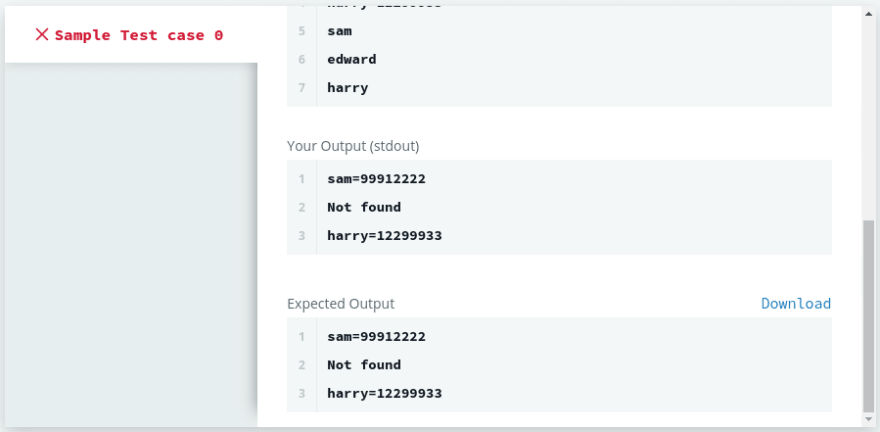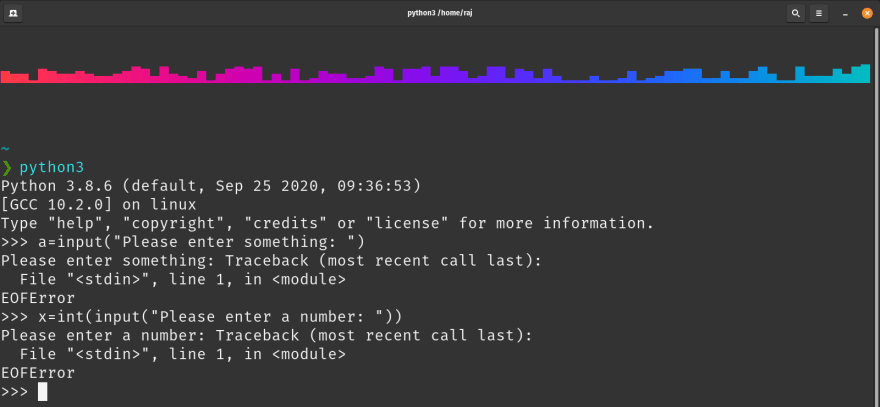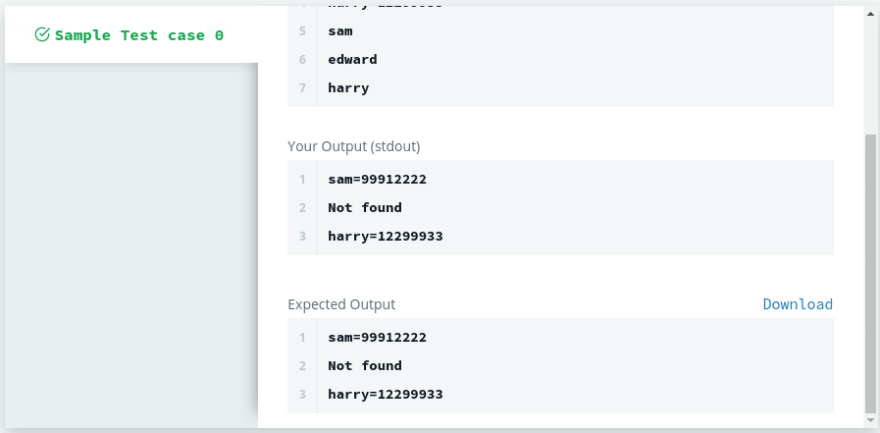Eoferror eof when reading a line что за ошибка
Исключения¶
Исключения возникают тогда, когда в программе возникает некоторая исключительная ситуация. Например, к чему приведёт попытка чтения несуществующего файла? Или если файл был случайно удалён, пока программа работала? Такие ситуации обрабатываются при помощи исключений.
Это касается и программ, содержащих недействительные команды. В этом случае Python поднимает руки и сообщает, что обнаружил ошибку.
Ошибки¶
Исключения¶
Попытаемся считать что-либо от пользователя. Нажмите Сtrl-D (или Ctrl+Z в Windows) и посмотрите, что произойдёт.
Обработка исключений¶
Обрабатывать исключения можно при помощи оператора try..except [1]. При этом все обычные команды помещаются внутрь try-блока, а все обработчики исключений – в except-блок.
Пример: (сохраните как try_except.py )
Вывод:
Как это работает:
Если ошибка или исключение не обработано, будет вызван обработчик Python по умолчанию, который останавливает выполнение программы и выводит на экран сообщение об ошибке. Выше мы уже видели это в действии.
В следующем примере мы увидим, как можно получить объект исключения для дальнейшей работы с ним.
Вызов исключения¶
Исключение можно поднять при помощи оператора raise [2], передав ему имя ошибки/исключения, а также объект исключения, который нужно выбросить.
Пример: (сохраните как raising.py )
Вывод:
Как это работает:
Сохраните как finally.py :
Вывод:
Как это работает:
Оператор with¶
Сохраните как using_with.py :
Как это работает:
Более обширное рассмотрение этой темы выходит за рамки настоящей книги, поэтому для более исчерпывающего объяснения см. PEP 343.
Резюме¶
Далее мы ознакомимся со стандартной библиотекой Python.
как решить ошибку «EOFError: EOF when reading a line» в python3?
Я совершенно новичок в python. Я хочу написать программу, которая проверяет, является ли число квадратным или нет. мой код:
код работает правильно в my IDE (pycharm community 2017 ), но он получает ошибку времени выполнения, как вы видите в online IDEs ( на geeksforgeeks ide ):
3 ответа
Я новичок, и у меня есть следующая проблема: всякий раз, когда я выполняю следующий скрипт (я использую Python 3.6) на VIM: def main(): print(This program illustrates a chaotic function) x=eval(input(Enter a number between 0 and 1: )) for i in range(10): x=3.9*x*(1-x) print(x) main() Я всегда.
Я не могу заставить следующий скрипт работать без исключения EOFError: #!/usr/bin/env python3 import json import sys # usage: # echo ‘[
Поэтому вам следует изменить условие в вашем while loop на:
Да, Измените его на :
вы предоставляете только 5 значений. Ошибка EOF возникает, если в input() нет данных . Это также объясняется в документации
Похожие вопросы:
Я пытаюсь решить проблему, используя следующий код: def inmobi(t): while t: li = map(int, raw_input().split()) n, ans = li[0], li[1:] one, two, op = [], [], [] for e in range(n): for i in range(1.
После создания exe из скрипта с py2exe raw_input() возникает EOFError. Как мне этого избежать? File test.py, line 143, in main raw_input(\nPress ENTER to continue ) EOFError: EOF when reading a line
Я новичок, и у меня есть следующая проблема: всякий раз, когда я выполняю следующий скрипт (я использую Python 3.6) на VIM: def main(): print(This program illustrates a chaotic function).
Я не могу заставить следующий скрипт работать без исключения EOFError: #!/usr/bin/env python3 import json import sys # usage: # echo ‘[
Пытаюсь решить проблему, но компилятор Hackerrank продолжает выдавать ошибку EOFError при разборе: не знаю, где я ошибаюсь. #!usr/bin/python b=[] b=raw_input().split() c=[] d=[] a=raw_input().
Я всегда получаю эту ошибку всякий раз, когда использую input() в Python3 в любом онлайн-компиляторе, hackerrank, wipro portal, interviewbit и т. д. Я видел так много постов по этому поводу, но ни.
Я пытаюсь использовать Bazel в качестве системы сборки для программы python. Я приведу пример test.py. Мой файл BUILD включает в себя: package(default_visibility = [//visibility:public]) py_binary(.
Я создал скрипт python3, который отлично работает в командной строке, но при попытке запуска в качестве демона в MacosX выдает ошибку EOFError: EOF при чтении строки. В основном код выглядит.
Python Exception Handling – EOFError
Moving along through our in-depth Python Exception Handling series, today we’ll be going over the EOFError. The EOFError is raised by Python in a handful of specific scenarios: When the input() function is interrupted in both Python 2.7 and Python 3.6+, or when input() reaches the end of a file unexpectedly in Python 2.7.
The Technical Rundown
All Python exceptions inherit from the BaseException class, or extend from an inherited class therein. The full exception hierarchy of this error is:
Full Code Sample
Below is the full code sample we’ll be using in this article. It can be copied and pasted if you’d like to play with the code yourself and see how everything works.
When Should You Use It?
To better illustrate these differences let’s take a look at a few simple code snippets, starting with the input_test_3.6.py file:
As you can see, the only thing we’re doing here is requesting user input() two times for a book author and title, then outputting the result to the log. Executing this code in Python 3.6 produces the following output:
That works as expected. After entering The Stand at the prompt for a title and Stephen King at the author prompt, our values are converted to strings and concatenated in the final output. However, let’s try executing the same test in Python 2.7 with the input_test_2.7.py file:
Running this and entering The Stand for a title immediately raises a SyntaxError, with an underlying EOFError :
As discussed earlier, the problem here is how Python 2 interprets input from the, well, input() function. Rather than converting the input value to a string, it evaluates the input as actual Python code. Consequently, The Stand isn’t valid code, so the end of file is detected and an error is thrown.
The resolution is to use the raw_input() function for Python 2 builds, as seen in raw_input_test_2.7.py :
Executing this in Python 2.7 produces the following output:
Everything works just fine and behaves exactly like the input() test running on Python 3.6. However, we also need to be careful that the input isn’t terminated prematurely, otherwise an EOFError will also be raised. To illustrate, let’s execute raw_input_test_2.7.py in Python 2.7 again, but this time we’ll manually terminate the process ( Ctrl+D ) once the title prompt is shown:
It’s worth noting that the gw_utility helper module isn’t written for Python 2 versions, so we don’t see the fancier error output in the previous Python 2 example, but otherwise the behavior and result is identical in both Python 2 and Python 3.
Airbrake’s robust error monitoring software provides real-time error monitoring and automatic exception reporting for all your development projects. Airbrake’s state of the art web dashboard ensures you receive round-the-clock status updates on your application’s health and error rates. No matter what you’re working on, Airbrake easily integrates with all the most popular languages and frameworks. Plus, Airbrake makes it easy to customize exception parameters, while giving you complete control of the active error filter system, so you only gather the errors that matter most.
Check out Airbrake’s error monitoring software today with a 30-day trial, and see for yourself why so many of the world’s best engineering teams use Airbrake to revolutionize their exception handling practices!
Monitor Your App Free for 30 Days
Discover the power of Airbrake by starting a free 30-day trial of Airbrake. Quick sign-up, no credit card required. Get started.
EOFError: EOF when reading a line


So as we can see in the pictures above, despite having produced the expected output, our test case fails due to a runtime error EOFError i.e., End of File Error. Let’s understand what is EOF and how to tackle it.
What is EOFError
In Python, an EOFError is an exception that gets raised when functions such as input() or raw_input() in case of python2 return end-of-file (EOF) without reading any input.
When can we expect EOFError
We can expect EOF in few cases which have to deal with input() / raw_input() such as:
Interrupt code in execution using ctrl+d when an input statement is being executed as shown below
Another possible case to encounter EOF is, when we want to take some number of inputs from user i.e., we do not know the exact number of inputs; hence we run an infinite loop for accepting inputs as below, and get a Traceback Error at the very last iteration of our infinite loop because user does not give any input at that iteration
Exit fullscreen mode
The code above gives EOFError because the input statement inside while loop raises an exception at last iteration
Do not worry if you don’t understand the code or don’t get context of the code, its just a solution of one of the problem statements on HackerRank 30 days of code challenge which you might want to check
The important part here is, that I used an infinite while loop to accept input which gave me a runtime error.
How to tackle EOFError
We can catch EOFError as any other error, by using try-except blocks as shown below :
Exit fullscreen mode
You might want to do something else instead of just printing «EOF» on the console such as:
Exit fullscreen mode
In the code above, python exits out of the loop if it encounters EOFError and we pass our test case, the problem due to which this discussion began.
Hope this is helpful
If you know any other cases where we can expect EOFError, you might consider commenting them below.
Discussion (0)
For further actions, you may consider blocking this person and/or reporting abuse


